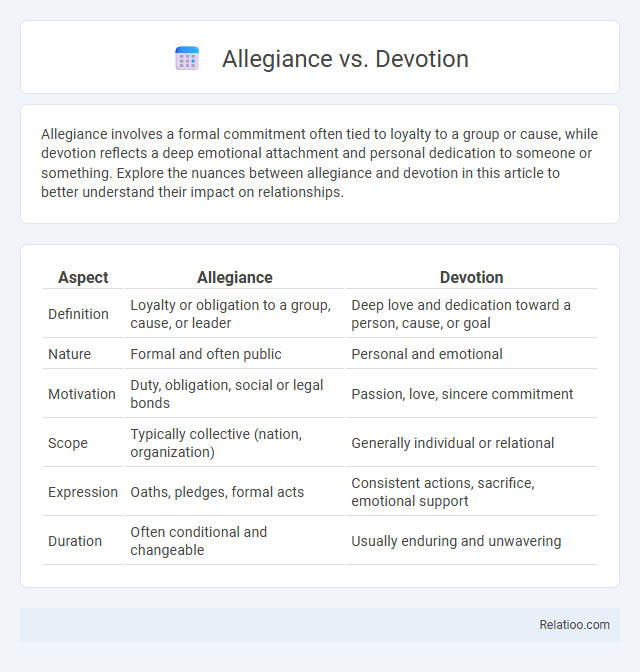Allegiance involves a formal commitment often tied to loyalty to a group or cause, while devotion reflects a deep emotional attachment and personal dedication to someone or something. Explore the nuances between allegiance and devotion in this article to better understand their impact on relationships.
Table of Comparison
| Aspect | Allegiance | Devotion |
|---|---|---|
| Definition | Loyalty or obligation to a group, cause, or leader | Deep love and dedication toward a person, cause, or goal |
| Nature | Formal and often public | Personal and emotional |
| Motivation | Duty, obligation, social or legal bonds | Passion, love, sincere commitment |
| Scope | Typically collective (nation, organization) | Generally individual or relational |
| Expression | Oaths, pledges, formal acts | Consistent actions, sacrifice, emotional support |
| Duration | Often conditional and changeable | Usually enduring and unwavering |
Understanding Allegiance and Devotion: Key Definitions
Allegiance refers to a formal loyalty or commitment to a sovereign, state, or group, emphasizing a binding duty often expressed through oaths or legal obligations. Devotion highlights a deep emotional attachment or dedication, typically associated with personal feelings and voluntary actions toward a person, cause, or belief. Understanding these distinctions clarifies that allegiance involves structured loyalty, while devotion embodies heartfelt commitment, both critical in social and political relationships.
Historical Contexts of Allegiance and Devotion
Allegiance historically signifies a formal, often legal, loyalty to a sovereign, state, or ruler, deeply rooted in feudal and political systems where subjects pledged obedience in exchange for protection. Devotion, in contrast, emphasizes a personal, emotional commitment or religious fervor, frequently associated with spiritual or moral dedication rather than political obligation. Historical contexts reveal allegiance as a binding societal contract, while devotion reflects individual faith and passionate attachment beyond institutional loyalty.
Psychological Foundations: Why We Choose Allegiance or Devotion
Psychological foundations of allegiance and devotion reveal distinct motivational drivers: allegiance often stems from social identity theory, where individuals align with groups to enhance self-concept and seek belonging. Devotion, rooted in intrinsic motivation and emotional bonding, reflects a deeper personal commitment based on values and passion rather than external affiliations. Neuroscientific studies highlight that allegiance activates reward circuits linked to social approval, while devotion engages areas associated with empathy and long-term attachment, explaining why people choose one over the other based on their psychological needs.
Allegiance in Politics and Society
Allegiance in politics and society refers to the unwavering loyalty and commitment individuals or groups express toward a nation, government, or cause, often influencing civic duties and political behavior. Unlike devotion, which may be more personal and emotional, allegiance carries a formal obligation and legal implications, shaping social cohesion and national identity. Your understanding of allegiance underscores its role in maintaining political stability and fostering collective responsibility within communities.
Devotion in Religion and Spirituality
Devotion in religion and spirituality signifies a profound emotional commitment and heartfelt dedication to a deity, spiritual practice, or sacred principles. Unlike allegiance, which often implies loyalty to a group or external authority, devotion encompasses inner reverence, worship, and continuous personal engagement in rituals or prayer. This deep spiritual connection fosters transformative experiences and cultivates virtues such as faith, humility, and compassion within the believer.
Comparing Loyalties: The Spectrum Between Allegiance and Devotion
Allegiance represents a formal, often institutional loyalty rooted in duty or obligation, while devotion signifies a personal, emotional commitment driven by deep affection or passion. Comparing loyalties reveals a spectrum where allegiance aligns with adherence to rules and collective identity, whereas devotion reflects individual fervor and intrinsic motivation. Understanding the nuanced differences between allegiance and devotion is essential for grasping how loyalty manifests in relationships, organizations, and cultural contexts.
The Role of Emotion in Fostering Devotion
Devotion is deeply rooted in positive emotions like love and affection, which strengthen your commitment to a person, cause, or belief. Allegiance often involves a sense of duty or loyalty driven by external factors such as rules or agreements, whereas devotion arises from heartfelt emotional bonds. This emotional investment fosters resilience and motivation, making devotion a more enduring and personal form of attachment than mere allegiance.
Allegiance vs Devotion in Personal Relationships
Allegiance in personal relationships emphasizes loyalty and commitment to a person or shared cause, often involving a sense of duty and honor. Devotion goes deeper, highlighting emotional attachment, care, and continuous support that nurtures intimacy and trust between partners. Understanding your balance between allegiance and devotion can strengthen trust and long-term connection in your relationships.
Impacts on Group Dynamics and Identity
Allegiance strengthens group cohesion by fostering loyalty and a shared sense of purpose, which enhances collective identity and commitment. Devotion, characterized by deep emotional attachment and self-sacrifice, can intensify personal bonds within the group, promoting resilience and unity. Your understanding of these distinctions helps in navigating group dynamics, balancing loyalty with personal passion to maintain a healthy, motivated community.
Navigating Allegiance and Devotion in Modern Life
Navigating allegiance and devotion in modern life requires understanding their nuanced differences and overlapping commitments. Allegiance signifies loyalty to a nation, group, or cause, often formalized through oaths or legal ties, while devotion reflects a deep, personal dedication driven by emotional or spiritual bonds. Balancing these concepts involves prioritizing values and responsibilities that align with both societal expectations and individual convictions.

Infographic: Allegiance vs Devotion
 relatioo.com
relatioo.com